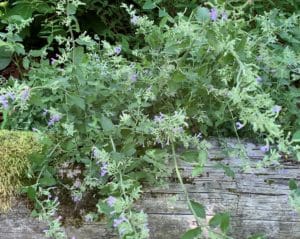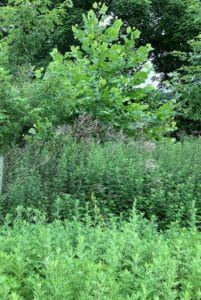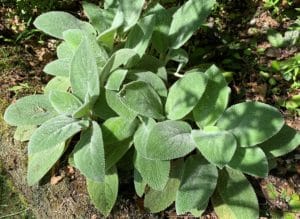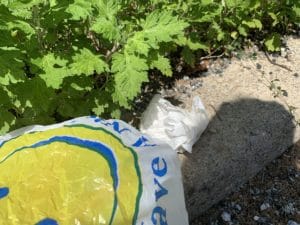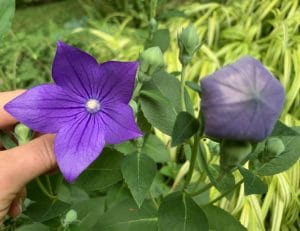Hello fellow readers, Did you ever wonder why folks toss trash out their window littering our world? Did someone teach them that? Or is it they have no respect for our dear earth. Rather than being angry about it as I used to be, I’ve begun to pick it up during road walks. I think of it as weeding undesirables in the garden of life … such as invasive Mugwort.
Speaking of which, last week, a group of six volunteers met at the Pocket Park in Blairstown for a cleanup. The park was designed and built a handful of years ago for residents, visitors, and patrons of Main Street and the seasonal Farm Market—A space to toss a ball or sit for a moment on one of the hefty stone benches under the cooling shade of the trees. There’s a Sycamore in a low spot solving the soggy soil dilemma. Plus, River Birch gracing the periphery with their see-through dancing leaves, revealing showy peeling bark.
Why removing Mugwort is tough.
Traditionally the Blair Academy kids help clean up the gardens with their Day of Service, which didn’t happen this spring because of the pandemic. Chrysanthemum-looking plumy colonies of invasive Mugwort (Artemisia vulgaris) plagues the park. It is also known as Common Wormwood; even the name sounds nasty. Their aggressive underground stems called rhizomes send out roots and shoots that travel two feet below the surface, making it a miserable invader to squelch.
Some say cutting Mugwort repeatedly to the ground every few weeks is an effective way to gain control. Others say removing the top growth stimulates rhizome production increasing the number of shoots. A frustrating dilemma!
Patti Doell of Little Big Farm reports they did a lot in a few hours. “We weed-whacked and pulled a bunch of Mugwort taking a whole truckload out.”
Adding ambitious Lamb’s Ear and Catmint
Last season, thanks to Blair Academy, which provided perennials, we added Lambs Ear (Stachys byzantine) and Catmint (Nepeta). Both are tough, ambitious, and deer resistant perennials that may outcompete and help keep the Mugwort out of the garden.
“They’re “really doing great. Great choices because we have a family of deer living around the area now – a momma and two fawns,” Patti said.
Speaking of Lambs Ear, I prefer ‘Helen Von Stein’ (Zone 4 to 9 – full to part sun). It’s known for its voluptuously sized fuzzy silvery leaves. It rarely flowers, unlike other varieties, which prevents prolific spreading that can become weedy. Plus, the foliage becomes less ratty in the heat and humidity of late summer. Lamb’s Ear pairs beautifully with Nepeta in Zones 3-8. It prefers full sun, though it tolerates some shade. We planted ‘Walker’s Low,’ a bit of a misnomer given it grows to about thirty inches with petite violet-blue flowers on fragrant grey-green foliage.
Plogging = Being part of the solution.
Back to picking up litter, aka weeding undesirables. Little did I know until writing all of you, there’s a name for picking up trash while jogging, walking, or hiking. It’s called plogging, plalking, or pliking.
Last week, I met a gal fetching her mail at the end of a private road. She saw me picking up litter. “Now I feel guilty,” she said. “Tomorrow, I’ll bring gloves and pick up the trash along our road.”
“Don’t feel guilty,” I consoled. “Seeing litter is frustrating.”
But there’s something about being part of the solution that shifts anger and frustration into a positive change. Imagine if we all did just that—one neighborhood at a time.
Garden Dilemmas? AskMaryStone@gmail.com (and now on your favorite Podcast App.)
Side note: Another favorite, not yet planted at the Pocket Park, is Balloon Flower (Platycodon grandifloras – Zone 4-8, part to full sun), which blends well with Lamb’s Ear and Catmint. When the flower buds are about to bloom, they look like the shape of little balloons that open to a star shape.
More about the Pocket Park in a related column, Day of Service.
I invite you to tune into Episode 18 of the Garden Dilemmas Podcast featuring: Walking & Plalking, Queens & Bachelors
How to remove Mugwort organically and make a meadow: Woodcock Mating Dance – Making a Meadow
more about Plogging :^)


